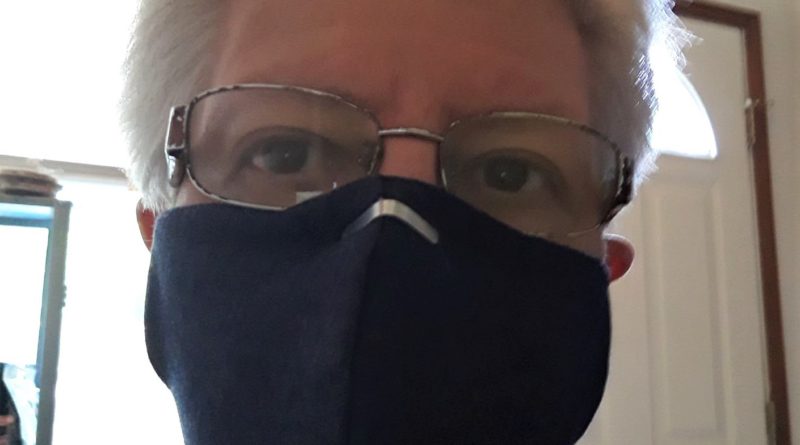ON WEARING A MASK by Cynthia Holder Rich
I write you from one of the hundreds of cities across the nation whose life has featured protests for more than a week. Racism and racial violence, and the names George Floyd, Ahmaud Arbery, Breonna Taylor, and many others are raised in calls for the grossly overdue development of a society where an increase of justice, safety, and democratic principles is evident and visible and tangible for all citizens. On top of the coronavirus pandemic, which has also hit the Columbus OH area hard, these days can feel very heavy.
On a bright and cool morning last week, I walked into a local store during the early senior hours. It felt completely normal. I felt completely normal. I was lost in thought about the news broadcast I had just heard in the car. I was moving through the world, thinking about what was happening—and not thinking about what I was doing or where I was.
I entered the store, grabbed a cart, and started wheeling through the aisles—and stopped.
People around me were wearing masks (of course), and I, lost in thought, had left mine in the car.
I wheeled around, walked quickly out of the store, and got my mask.
After returning to the store, with my mask on, I remembered something I have often realized in this new season. Wearing a mask makes it harder to breathe.
My shopping that morning afforded me an opportunity for reflection on these times in which we are living and moving and having our being. As it is harder to breathe, I was more aware of how fast I wanted to finish my shopping. As some people in Columbus see the wearing of masks as a political statement, I was aware that some fixed angry stares on my mask-covered face. As I worked to observe the directional arrows on the floor in each aisle and stay at least 6 feet from other shoppers, I was aware of how I was moving through the space—and how others were—in ways that I have not been in the past. Some people were not wearing masks—which signified potential danger. Some shoppers weren’t working to avoid others—also potentially perilous. Although the store was to be open at that time only to seniors and others with medical conditions, the presence of a group of noisy teens moving through the aisles reminded me that the store’s posted policies were probably not being enforced. That is, the rules set in place to protect me could not be relied upon to do so.
Back in the safety of the car (a safety on which I can rely most days, granted to me because of privilege I have neither earned nor deserve), it occurred to me that all of these factors are forcing me to be more self-aware, to think, to stop, to question—to ask whether a trip is necessary, whether a space is safe, who is around me, and whether the rules in place will offer me shelter.
In February, before the growth of a global pandemic turned the world upside down for so many of us and so many in the world, my husband Mark and I wrote on our mission webpage Mark and Cynthia in Tanzania about Being White in Africa. Since then, on top of the spread of the coronavirus with so many people getting sick, so many lives lost (over 112,000 in the US alone at this writing) and so much grief, protesters have thronged the street in cities in all 50 states and in many countries across the world, demanding increased access to justice for Black, indigenous, and other people of color.
Wearing masks has heightened our awareness of where we are and how we are perceived as we walk through the world. It has given us a chance to reflect on what it means to always have to be aware of where one is and how one is perceived—as some of those we love have had to do throughout their lives (for more information on this, check out a few stories of our loved ones’ daily realities in a recent post on Facebook). It has reminded us of how hard it is to breathe when being in public leads rational people to be anxious, and some to take that anxiety out in hate-filled and violent acts. It has opened my eyes, again, to the reality that although rules have been set to protect us all, there are people around me who do not and cannot trust that those rules—laws—constitutional statutes will apply to them nor offer them protection, no matter how inspiring the legal rhetoric. Wearing a mask can make it harder to breathe—but for some, breathing is a luxury they may not be granted. And—unlike the color of one’s skin, for our friends and family and colleagues who are not white—a mask is something we can take off.
We who follow Jesus are called to reflect on the realities different people made in the image of God face and in which different ones of us are forced to live. Reflection could—and must—lead to confession—repentance—and change.
Cynthia Holder Rich is the founder and director of ecclesio.com

